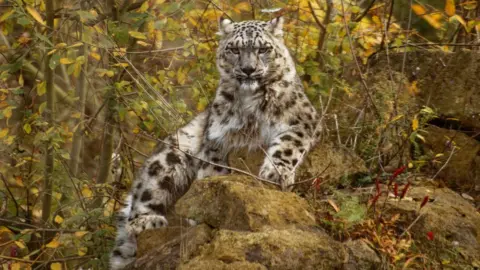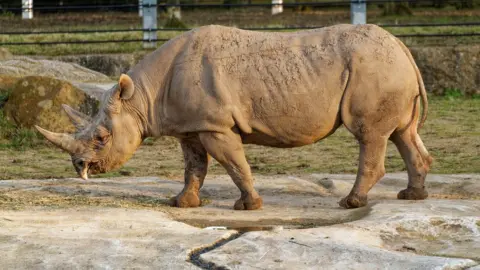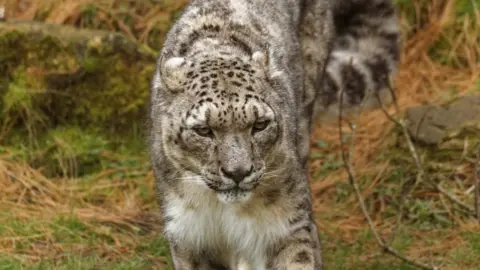Twycross Zoo conservation 'halted by lack of Brexit forms'
 Twycross Zoo
Twycross ZooA zoo says its conservation programme has stalled due to a lack of post-Brexit paperwork.
Twycross Zoo had been due to export its critically-endangered Amur leopard for breeding but said the forms used before the UK left the EU had "vanished".
It has called on the government to urgently issue replacement forms.
The Department for Environment, Food and Rural Affairs (Defra) said animal exports were still permitted in line with the import rules of EU countries.
The Leicestershire zoo has been involved in leopard breeding programmes for about 20 years.
In both 2014 and 2016 it welcomed litters of Amur leopard cubs.
Neil Dorman, curator at Twycross, said: "They're a lovely species and it's what we want to get back to."
But he said Brexit had had a "real impact".
"The paperwork that existed before Brexit has literally just vanished so all of those permits now need to be rewritten," he said.
"Once that piece of paperwork is in place, that will get used each time, but at the moment it doesn't exist."
He added it was the government's responsibility to prepare the necessary forms, and he called on Defra to urgently act.
In the meantime, he said they could not cooperate with breeding programmes.
The zoo had planned to send its female Amur leopard Samara to a potential breeding partner at a zoo in Belgium, but the move has been put on hold.
There are fewer than 100 Amur leopards left in the wild, according to Mr Dorman.
"It's really critical that zoos work together to make sure we have safety net populations in captivity so that we can at least save the species from extinction," he said.
 Twycross Zoo
Twycross ZooThe paperwork problems also mean the zoo does not now have the enclosure space for a new snow leopard needed for breeding.
In addition, there are concerns about potential overpopulation of some animals because they cannot be exported.
Mr Dorman said: "One of the solutions would be to use contraception for some of the species so we can manage the numbers that we've got.
"We don't want to get to a point where we're breeding more animals than we can manage."
 Twycross Zoo
Twycross ZooThe Brexit problems come at a time when the financial impact of coronavirus is already putting a strain on breeding programmes.
Zoos have had to remain closed to the public for most of the pandemic leaving them significantly short of income.
Mr Dorman said: "It's not a cheap exercise if you're moving animals to another part of the world."
The British and Irish Association of Zoos and Aquariums (BIAZA) said a system used for tracking the relocation of zoo animals showed there had not been a single international animal movement from the UK since the start of 2021.
In comparison, it said 155 animal movements were recorded in January 2020.
Dr Cerian Tatchley, senior manager at BIAZA, said: "The lack of Brexit infrastructure for the movement of zoo and aquarium animals is affecting a wide number of zoos, their conservation work and therefore their ability to fight against extinction.
"While the focus has been on infrastructure to support agricultural animals, it feels like the important work of zoos and aquariums has been overlooked in these early months of Brexit."
A Defra spokesperson said: "Zoo animals can still be moved between GB and the EU, provided that they comply with the national import condition of the EU country of destination."

Follow BBC East Midlands on Facebook, Twitter, or Instagram. Send your story ideas to [email protected].
